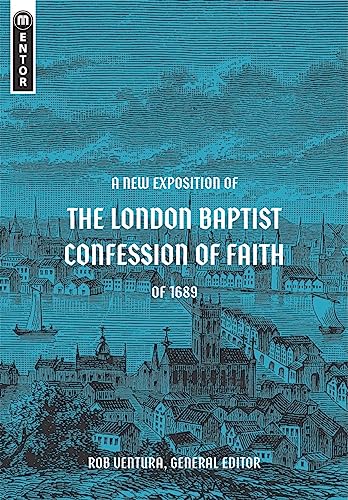A New Exposition of the London Baptist Confession of Faith of 1689
Written by Rob Ventura, ed. Reviewed By Branden R. PreedyRecent years have seen a growing interest in a more creedal and confessionally rooted expression of the Christian faith. Even among the Baptists, there has been a recognized need to retrieve historic Christian confessions to renew the church. Chief among the Baptist confessions is the Second London Baptist Confession of Faith of 1677/89 (2LBC), and a new resource for retrieving that time-tested confession is the recent Rob Ventura edited volume.
The book’s organization is what you would expect if you are familiar with the 2LBC: thirty-two chapters: each chapter corresponding to a chapter in the Confession. Each chapter contains the full text of the Confession, followed by an exposition, and concludes with pastoral and practical application. Preceding the chapters is an introduction, an entry on the historical overview of the Confession, and the Letter to the Reader, included as the original preface to the 2LBC. At the end are a name index, a Scripture index, and a subject index for easy reference.
To “promote the glorious biblical faith” expressed through the 2LBC, to edify the saints, and strengthen the holiness and doctrine of churches, Ventura has gathered more than twenty men of various contexts and backgrounds to contribute chapters (p. 10). Because this is a multi-authored book, with each contributor writing multiple entries, it would prove challenging to review each author’s work individually. As Ventura points out, the men who contributed “may not agree with each other’s every ‘jot and tittle’ that he has written” (p. 10). Therefore, to fairly present the contents of this work, highlights from select chapters will be used to demonstrate the book’s strengths and weaknesses.
While this book is an exposition of the 2LBC, what you’ll walk away with more than anything else is that Scripture is supreme. This emphasis on the supremacy of God’s word is one of the strengths throughout the work. As John Rueuther, pastor of Covenant Baptist Church and author of The Gift of the Holy Spirit, points out in the first chapter, “In this exposition of Chapter 1, and the expositions which follow, we are examining and explaining the Confession to show that the Confession represents the teachings of Scripture” (p. 59). A shared commitment among the contributors to canonical biblical interpretation and Scriptural exposition consistently comes through in this book. As you read through this exposition, from chapter 1 to chapter 32, each section will lead you to search the Scriptures, testing every doctrine against the Word of God, as you are strengthened in the “faith once for all delivered to the saints” (Jude 3).
Like most books, though, this volume is not without its shortcomings. One issue present is the tendency of contributors to include interpretations of the Confession’s text rather than a modern-historical exposition. Rather than expositing the Confession, many chapters read more like interpretations, through the lens of Scripture, from a level of subscription that is distinct from both historical and full subscriptions. This issue becomes apparent as early as chapter 2 in Sam Waldron’s treatment of “God and the Holy Trinity.”
Waldron, president of Covenant Baptist Theological Seminary and author of A Modern Exposition of the 1689 Baptist Confession of Faith (Darlington: Evangelical Press, 1989), spends a good deal of his chapter on “God and the Holy Trinity” defending classical attributes of God, including his singularity/simplicity, aseity, and impassibility. Waldron even defends the doctrine of eternal generation against modern theologians who deny this doctrine based on upholding the eternal subordination of the Son. However, this exposition of the third paragraph in chapter 2 of the Confession soon turns interpretative. Waldron utilizes the doctrine of eternal generation to introduce the personal subordination of the Son and Holy Spirit to the Father. He concludes his chapter by practically applying the Trinity to “how virulently anti-Christian is the foundational claim of modern feminism and egalitarianism” (p. 85). While God-ordained gender roles should be affirmed and upheld, theologically rooting such distinctions in the doctrine of the Trinity is inadequate and moves beyond the scope of the Confession. Waldron’s appeal to the Trinity as a corrective to feminism and egalitarianism moves this section from pure exposition to individual interpretation.
Though the book is titled, A New Exposition…, it might be more aptly titled, A Scriptural Interpretation of the London Baptist Confession of Faith of 1689. Many chapters in this book are good, and each is Scripturally saturated. However, due to the interpretive moves by a number of contributors, this work cannot be considered strictly or merely an exposition. As it is, Ventura’s volume is an imperfect yet welcome addition to confessional Baptist resources. For one looking for a contextual-historical exposition of the 2LBC, consider James Renihan’s book from Founders Press, released nearly simultaneously with this volume titled, To the Judicious and Impartial Reader.
Branden R. Preedy
Branden R. Preedy
Midwestern Baptist Theological Seminary
Kansas City, Missouri, USA
Other Articles in this Issue
Early Christians had to develop and negotiate their (new) identity within a society, to which their beliefs and ethical convictions were largely alien...
Acts of the Apostles reports several uprisings and instances of mob violence that occur across Asia Minor, caused by or related to the evangelistic and missionary endeavors of Paul and his companions in the middle of the first century...
As states continue to decriminalize marijuana and usage escalates in American culture, Christians must increasingly navigate their associations with the drug...
This article seeks to retrieve from the past in order to gain perspective for the present...
The book of Ecclesiastes is essentially a speech...







